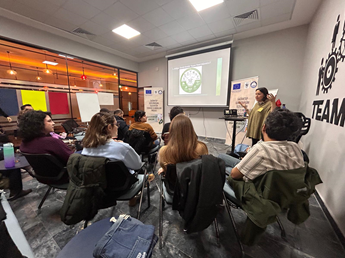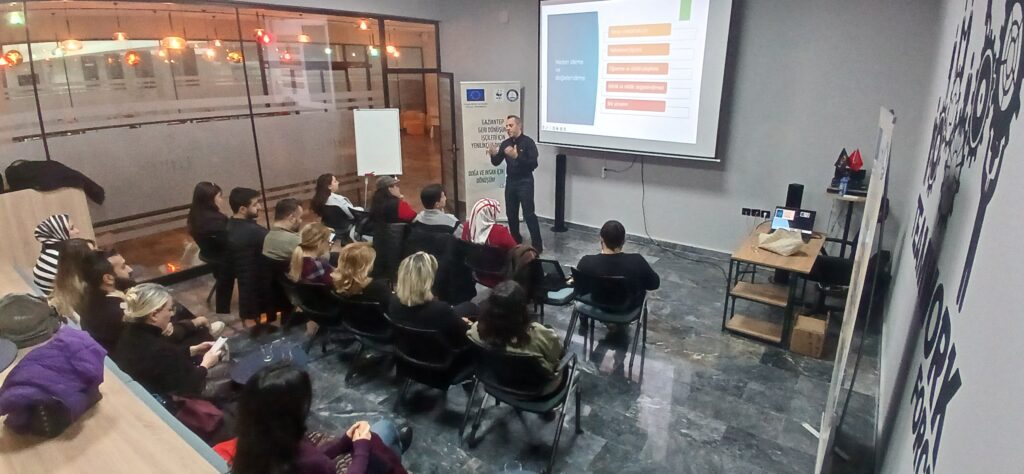WWF-Turkiye partners with local NGOs to improve informal recycling in Şahinbey, Türkiye’s second-largest district

In January 2024, WWF-Türkiye launched a groundbreaking three-year project titled “Innovative Business Models for Gaziantep Recycling Workers,” funded by the European Union. This initiative targets Şahinbey Municipality—Türkiye’s second-largest district—as a strategic pilot area for transforming waste management practices while improving the lives of informal waste workers.
Gaziantep: Trailblazing Sustainable Waste Management Solutions
The project strengthens local civil society organizations (CSOs) supporting waste pickers in Gaziantep, focusing on enhancing management and project skills. By building capacity among informal waste workers, the initiative aims to improve livelihood opportunities and working conditions for street collectors and their families while promoting innovative recycling techniques.
WWF-Türkiye laid the groundwork in early 2022 with workshops in collaboration with the Union of Turkish Municipalities. These sessions explored best practices, challenges, and the crucial role of waste pickers in the recycling ecosystem. Implementation began in Şahinbey Municipality in partnership with Gaziantep Metropolitan Municipality in September 2022.
Data-Driven Support for Informal Waste Worker Communities
Comprehensive field research was conducted with 150 individuals selected from 1,500 registered waste pickers in Gaziantep. Surveys and focus groups assessed their quality of life based on income levels, rights awareness, literacy, and entrepreneurship skills.
This data guides the evaluation of CSO services and strengthens support mechanisms. By identifying educational needs, the project creates targeted programmes addressing literacy gaps and developing essential skills. Training programmes offered by local CSOs enhance economic independence and rights awareness, improving work efficiency in the recycling processes while increasing a sense of confidence among waste pickers for being seen as a dignified contributor to societal needs.
WWF-Türkiye’ General Manager Ömür Kula emphasized that recycling workers do a very important job for nature protection by preventing plastic and harmful waste from mixing with nature. Kula said, “It is estimated that recycling workers collect at least half of the packaging waste coming from households and contribute to the economy. Otherwise, at best, it will be buried in the ground, and in another possibility, it will pollute nature. I cannot emphasize enough the importance of collecting this waste. If we can contribute to everyone working in this field living and working in more humane conditions, we will be very happy. Our goal is to carry the business model we will create here to other municipalities and all of Türkiye.”
Towards Lasting Impact: Empowering Local Organizations
A key component is the capacity-building training programme launched in August 2024 for civil society organizations. Through 10 specialized modules, CSO staff, volunteers, and management teams gain knowledge and skills to provide effective, sustainable services.

Despite challenges—including limited local CSO expertise in supporting waste pickers and variable participation levels—the project has successfully enhanced capacities of over 15 organizations. Ninety individual participants now deliver more effective services, with enhanced awareness of occupational safety and environmental sustainability.
Organizations have received essential tools (reports, standards, training materials) to develop inclusive initiatives addressing challenges faced by waste pickers and vulnerable communities involved in the informal waste sector.
Innovation in Action: Success Stories
The project has already catalyzed tangible outcomes. One participating CSO has secured grant funding to improve working conditions for waste pickers and their families, implementing solutions based on environmental, economic, and social sustainability principles.
Another entrepreneurial NGO now upcycles textile waste into clothing items, including bags made from recycled materials—contributing to waste circularity while supporting local livelihoods.
Strong collaborations among local CSOs have created opportunities for wider impact. Organizations now focus more on green jobs, sustainable economy, and rights-based projects for disadvantaged communities while advocating for policy development.
Through this comprehensive approach, the project in Gaziantep demonstrates how strengthening local capacity can transform waste management practices while improving lives—creating a model that could be replicated across Türkiye and beyond.


